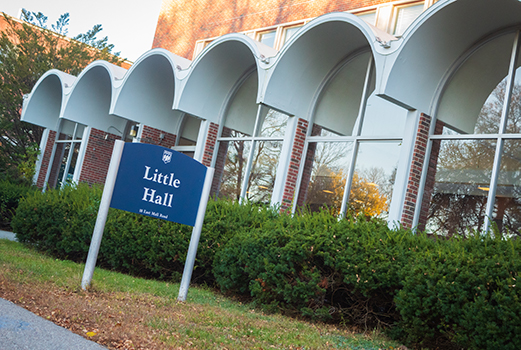Little Hall is without a doubt the most controversial building on the University of Maine’s campus. Named after Clarence Cook Little in 1966, the name holds a complicated history. Although Little contributed to oncology and tobacco research, he also took an interest in eugenics. Eugenics is an outdated theory that defines desirable traits, and seeks to encourage people with the most “desirable” traits to reproduce with similar people. According to the theories of eugenicists, desirable traits were considered to be fair skin and able-bodiedness and undesirable traits were darker skin and disability. Little was also pro-birth control and pro-euthanasia which along with his interest in eugenics made him highly controversial. He promoted marriage segregation laws and was a firm believer that interracial love was immoral and these couples should not reproduce. Little’s other research inquired into tobacco usage and its links to cancer, finding that tobacco usage increased one’s risk of contracting cancer, but he hid these results from the public.
Despite his concerning interests, Little was elected as UMaine’s sixth president in 1922 and served until 1925. While at UMaine he began founding what is now known as Jackson Laboratory in Bar Harbor. From 1925 through 1929, he served as the president for the University of Michigan but later returned to Bar Harbor for his work in Jackson Laboratory.
Little Hall was named in 1966 but the name is now under revision by task forces and President Joan Ferrini-Mundy. UMaine’s Assistant Vice President for Student Life and Senior Associate Dean Kenda Scheele chaired both the first and second task forces charged with renaming the building. The first committee was tasked with deciding whether or not Little’s name should be removed, what the criteria should be for removing someone’s name from a building and to suggest alternate names to the board of trustees with rationale as to why those names are appropriate. The committee voted that Little’s name must be removed. They, then, stated their case to the board of trustees in a report which is widely available on UMaine’s website.
In the 13-page report released on June 23, the task force makes a clear statement that Little’s contributions to UMaine are outweighed by his commitment to harmful scientific research.
“[T]wo major aspects of his career are disturbing today,” the committee stated. “First, he was a notable figure in the eugenics movement in the United States, which sanctioned the identification and forced sterilization of individuals with 2 undesirable characteristics. Second, he was the lead expert in the tobacco industry’s attempt to hide the link between smoking tobacco and cancer. Little’s leadership in these latter two areas raise doubts about the appropriateness of having his name on a campus building. His short tenure as UMaine president (his only formal relationship to the university) raises further questions about whether or not he merits the symbolic honor of a building named after him in perpetuity.”
The task force also shares in their report that the University of Michigan, where Little was also president, voted to remove his name in 2018 from one of their buildings due to his professional endeavors violating current community values. The task force recommends that UMaine follows suit and removes Little’s name immediately. Currently, Little Hall is home to modern language and psychology departments at UMaine.
Most importantly for the renaming of the building, this report notes six important criteria that must be met when generating a new name. These factors include pedagogy, due diligence, interpretation, commitment, revision and historical institutional context. The committee finds pedagogy to be the most important value as it is ranked first on the list.
“UMaine building names should provide opportunities for learning about our past and the purpose of the university,” the website for the office of the president states. “This can include names that recognize the distinguished lives of alumni, extraordinary acts of generosity, path breaking achievements by faculty, and important administrative leadership as well as individuals who have made notable contributions to local, state, or national life.”
The second task force, also led by Scheele, is working closely with Ferrini-Mundy to decide on a new name. According to the website for the office of the president, this committee will review the June 23 report and use the six criteria the report lays out to choose a new name. Scheele remarked that this second report is very confidential because if a name suggestion is leaked and not chosen, people could end up upset if their suggestion was not chosen. The suggestion will go to a subgroup of the board of trustees for approval, and if they approve it will go to the full board of trustees. Ultimately, Ferrini-Mundy will have the final say on the name that replaces Little Hall.








